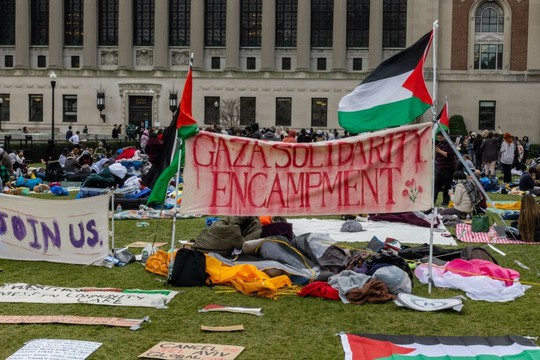Students occupy the campus Columbia University, calling for the school to divest from companies with ties to Israel.
Photo: AFP
Columbia University canceled in-person classes Monday as campus protests over the war in Gaza enter a sixth day. The protests have swelled after the school administration called in the police to clear a student encampment last week, resulting in over 100 arrests. Solidarity protests and encampments have now sprouted up on campuses across the country, including at Yale, MIT, Tufts, NYU, The New School and University of North Carolina at Chapel Hill.
In New York, Columbia University has canceled in-person classes today as campus protests over Israel’s war on Gaza enter a sixth day. Classes will be held online. The protests have swelled after the arrest last week of over 100 students.
Over the weekend, solidarity protests and encampments also began on other college campuses here in New York City at NYU, at The New School, as well as across the country, including at Yale, MIT, Tufts, Vanderbilt and University of North Carolina, Chapel Hill.
Palestinian reporter Jude Taha, a journalism student at Columbia University, describes events on campus as “an unprecedented act of solidarity” that student organizers are modeling on antiwar protests in 1968:
“Right now what we’re seeing at Columbia is an unprecedented act of solidarity, set up by students who initially set it up on the South Lawn and then faced violent arrests and a lot of repression from administration and ended up moving to the opposing lawn. And what we’re seeing right now is just swaths of people, initially without tents, sleeping on the ground, in sleeping bags, some of them without sleeping bags, on grass, outside in the cold, under the rain.
I think what had happened initially was students showed up at the lawn at around 4:30 a.m. They are members of a solidarity group called Columbia University Apartheid Divest, which is made up of many student groups. And they had been planning this for months, according to my interviews with organizers. They studied the 1968 protests. They studied the tactics used. And they were prepared to go. Initially, we did not know this as outsiders. The tents were set up, and a lot of people were caught off guard. But what happened is, after they set up tents, we quickly saw an outpour of support. Picket lines were forming. Students were joining from outside. And initially what I saw to be like 40 to 50 students is now, on the opposite lawn, nearly a hundred to a hundred students coming in and out of the encampment.
The arrests were shocking. However, what was truly inspiring to see is that students did not let that deter them. Shortly after the arrests were carried out and after protests were surrounding the lawn where the original encampment was at, students starting jumping into the opposing lawn and pitching up tents there. And this is a reaction not only to Columbia’s silencing of students and the fact that students feel unheard, uncared for and not represented well by the institution that they attend, but this is also, very much so, focused towards the ongoing genocide in Gaza and the way the students are feeling, seeing the massacres happen every day, with nearly over 30,000 people have been killed. Their frustration is that they are complicit in this and their university is complicit in this. And they want to make sure that their voices are heard. And they want to make sure that what they’re asking is met. And so, this is inspired by the 1968 protests. They just decided to follow course.
New York Police Chief John Chell said that officers found the students to be peaceful and cooperative. We were present from day one, from nearly 6:00 in the morning, in the original encampment. And there was no instance of violence that I am able to report. The protesters were incredibly peaceful.
In relation to what the police chief said, I have to agree that I was not able to identify any violence or any danger that is present from these students, especially right now in the second encampment, where there is a thriving community, where people are bringing food, blankets. Students are leaving their belongings, their personal belongings, for hours with no worry that they will be taken. There is no fear amongst them.”
read more in our Telegram-channel https://t.me/The_International_Affairs

 11:38 25.04.2024 •
11:38 25.04.2024 •























